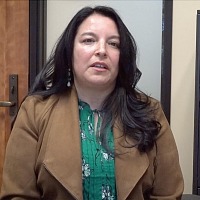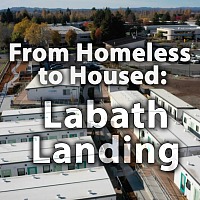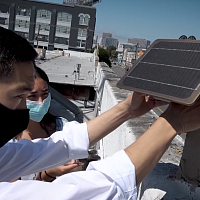Jasmine Garsd
February 15, 2019 3:25 PM ET
A mayor from another city that tried to land big tech companies might be starting to look pretty smart after Amazon canceled its plans for a New York City headquarters. Activists and local politicians said New York had given up too much for too little.
But it doesn't have to be that way, says San Jose, Calif., Mayor Sam Liccardo, who refused to offer Amazon and another tech giant, Google, any incentives to locate in his city.
Amazon's decision to back out of the New York City plan followed opposition from activists and local politicians over the hefty tax breaks and incentives the company would have gotten when it moved in.
As big tech companies expand nationwide, cities continue to grapple with how to make sure they are benefiting. One example is San Jose.
Last year, when Amazon was looking for a city to house its second headquarters, Liccardo threw San Jose's hat in the ring. But unlike the various cities that promised generous tax incentives, San Jose offered Amazon no money. "If you're offering incentives, those are dollars you could use to be building out transit ... supporting an ecosystem of talent development," Liccardo says.
When Amazon ultimately picked New York for one of its new campuses, many activists said it made no sense for one of the world's wealthiest companies to get big tax breaks and other incentives. It caused such local outrage, Amazon announced it was pulling out. "The lesson for cities really ought to be, don't take the bait. And don't even offer the bait," Liccardo says.
"Our residents spend a lot of time commuting," San Jose Mayor Sam Liccardo says. "We're right up there with the worst cities in commutes and obviously it drives up the housing costs. And so we get the worst of both worlds."
Which is not to say he doesn't want Big Tech headquartered in San Jose — Adobe, Cisco and eBay are based there.
"We're the only major city in the United States that actually has a smaller daytime population than nighttime population," Liccardo says. "And, as a result, our residents spend a lot of time commuting. We're right up there with the worst cities in commutes and obviously it drives up the housing costs. And so we get the worst of both worlds."
Liccardo says when he was approached by Google, which was interested in building a campus in San Jose, the company didn't ask for incentives and his government didn't offer any. Rather, the mayor says the city is requiring that 25 percent of the housing built around the campus be rent-restricted and affordable. As in most of the Bay Area, the cost of living in San Jose has skyrocketed, largely driven by the tech boom.
Google, which is headquartered in nearby Mountain View, is projected to bring tens of thousands of jobs to San Jose. And Liccardo says the company agreed to fees on development to help fund affordable housing.
Google is planning to develop as much as 8 million square feet in downtown San Jose. The city lacks the allure of San Francisco or neighboring Palo Alto, so it's not hard to see why some are so excited to develop it.
But plenty of locals and activists are not happy with Google moving in.
Jeff Buchanan, the policy director at Working Partnerships USA, a community labor coalition, says that even if San Jose isn't offering big tax breaks, that doesn't mean Google's move will be good for the city.
"Maybe we're not offering billions in tax rebates," he says. "But we're offering really valuable public land in an area where prices are going through the roof. Google is just on the beneficial side of things going their way, without having to give anything back."
Like many activists in the various cities where tech is expanding, Buchanan has questions about the details: How exactly is housing going to be kept affordable? And, of all those jobs coming to town, how many will go to locals?
"When you look at Google's workforce," Buchanan says, "only about 7 percent are either Latino or African-American. You look at the population of San Jose, and it just looks incredibly different than who it is that Google is actually hiring."
Expensive housing has been a problem for people like Joseph Chavez. A few years ago, it was so bad that his family — like so many others — had to leave San Jose. "The prices are so outrageous, we've got to move to the Central Valley to actually have affordable homes," he explains. "So with Google coming here, it might be a bad idea. Rent's going to go sky high."
But Chavez works in construction, and he hopes to work on the new San Jose Google site. "More jobs means more opportunities. More opportunity means everybody gets to eat. If it pays well, you might be able to make it," he says.
Whether he'll be able to make it in San Jose after the Google campus gets built, that's an open question.

 Live Radio
Live Radio

































